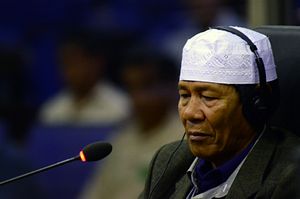Ever since Cambodia’s prime minister Hun Sen asked the United Nations in the late 1990s to back his plan for a trial of surviving Khmer Rouge leaders, legal scholars, academics and journalists have argued whether genocide should have been included among the raft of charges that followed.
The overarching charge of crimes against humanity along with murder and torture were among the convictions that nailed the prison camp commandant Kaing Guek Euv, alias Duch, Brother Number Two Nuon Chea and former head of state Khieu Samphan at the Extraordinary Chambers in the Courts of Cambodia (ECCC).
Genocide, some say, is different from other charges, in part due to arguments over legal definitions and the interpretation of UN conventions. Some within the Jewish community argued the word “genocide” should only apply to the persecutions orchestrated by Nazi Germany.
Even Duch’s conviction for the calculated deaths of 12,000 people – tiny in scale when compared to the accepted figure of 1.7 million to 2.3 million people who perished under Pol Pot – often on the basis of ethnicity and cultural identity had failed to convince some that a genocide had occurred. The alleged victims include more than 100,000 Muslim Chams and a further 20,000 Vietnamese who died as the Khmer Rouge imposed their severe interpretation of Communism across the country.
Despite the opposition, prosecutors pressed for genocide. Charges against Nuon Chea, 89, and Khieu Samphan, 84, were laid and evidence produced over recent days from witness testimonies was as startling as it was compelling in a trial already noted for its grisly and macabre back stories.
The court heard how members of the Khmer Rouge, which ruled Cambodia from 1975 to 1979, held competitions to see how many prisoners they could murder in an hour at Wat Au Trakuon, a converted prison camp where perhaps 20,000 people were killed.
Muslim Chams were forced to eat pork and banned from using their traditional language while Qurans were collected and burned as they were rounded by a Khmer Rouge unit known as the Long Sword Militia.
“No more prayers. No more religion,” said It Sen, 63, the tribunal’s first Cham witness to testify in regards to genocide. “We were not allowed to speak Cham anymore. Only Khmer was allowed… If they heard us speaking Cham, we would be taken away and killed.”
Thousands were drowned in the Mekong River after a Cham uprising in 1975 at Koh Phal.
“I never saw my wife again,” It Sen said. “I conclude that my wife and my child who was with her died. However, I do not know how they died. It is possible that they were taken away and killed or that they were drowned.”
Samrit Muy, a soldier with the militia, corroborated the evidence, saying he witnessed a large group of Cham men, women and children as well as pregnant women and the elderly being marched off to their deaths.
“Whenever they wanted to kill people, they would bring them to the pagoda and loud music would be played,” Muy said, to muffle out the sound of the killing.
“I didn’t see inside the pagoda,” he said.
“The music was played over loudspeakers and I knew in my head back then that people were being killed,” he said. “That happened until there were no Cham people left in the village.”
“I didn’t dare to stay close to the arrested people. I was afraid and I don’t know why innocent people were taken away and killed,” he said.
Other senior Khmer Rouge leaders have passed away and escaped ECCC conviction.
The most recent was Ieng Thirith, the former minister for social affairs who died last month after being ruled mentally unfit for trial. Her husband, Ieng Sary, is the only man in history to be charged with genocide twice. He too died before justice could be rendered.
The trial continues.
Luke Hunt can be followed on Twitter @lukeanthonyhunt

































